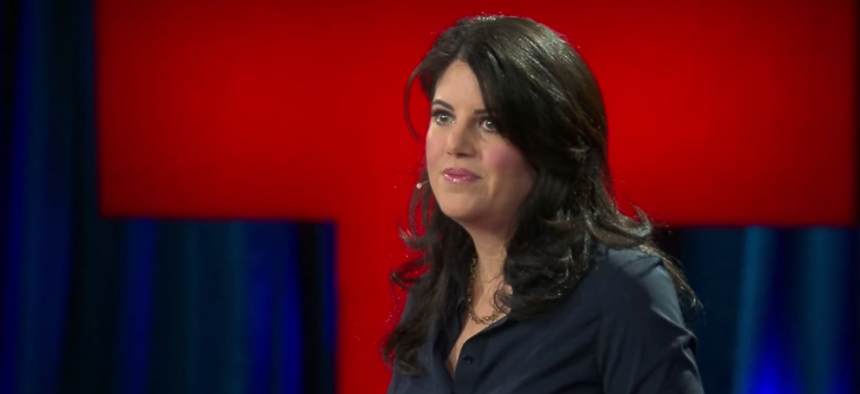
TED via YouTube
Seventeen Years Later, Monica Lewinsky Has Taken on the Culture of Humiliation — and Won
"Shame cannot survive empathy" Lewinsky said.
“I was branded as a tramp, tart, slut, whore, bimbo, and of course, That Woman,” said Monica Lewinsky, self-proclaimed patient zero of online harassment and cyber bullying, on the stage of the TED global conference, “Truth & Dare.”
It was a tough bit of branding to live through as a 25-year-old—and she almost didn’t. After becoming sexually involved with her boss (Bill Clinton, who despite lying to the country while president, enjoys a terrific reputation in America) when she was fresh out of college, she thought about killing herself. That one mistake, of having an affair—a small mistake, really, on her part, huge on her boss’s—tainted her coming into womanhood, because America (and the world) did not stand up for her and instead found it easy and appropriate to judge, shame, humiliate.
Humiliation, Lewinsky said, quoting a recent study, has been found to be “a more intensely felt emotion than either happiness or even anger.” It will forever be a defining trait of the person she is now. Amends will never be made for the horror of having everyone comment on her appearance, her weight, her intelligence (plenty of which appears whenever she writes or speaks on camera, by the way).
But Friday, as she stood strong, beautiful in spirit, and brave in her blue—yes, blue—shirt, presenting herself and her story as a beacon of hope against what she correctly labeled the “culture of humiliation”—she was no longer the victim. In fact, halfway through her talk, the story of how and why she got there was but a faint background thought. She was inspiring. She was moving. Her vulnerability turned into power—displayed so honestly, and fully owned.
“You can insist on a different ending to your story,” Lewinsky said—making it all the more believable by being the living proof.
Addressing the victims—chiefly women, minorities, members of the LGBTQ community—of the culture of humiliation, which the internet amplifies by exploiting shame for clicks, Lewinsky offered herself as the evidence that “you can survive it,” that there is life—as there should be—even after shame.
Without rage, just the calm fierceness of someone who believes in herself, Lewinsky called for the ultimate weapon to fight humiliation: compassion. “Have compassion for yourself,” she told those who are experiencing cyber bullying; show empathy, she asked everyone else, because: “Shame cannot survive empathy.”
Lewinsky was the subject of shaming because she was woman—the feminine in her was attacked and judged with the utter strength (sadly, by women, too ). “There is no equality in scandals,” crisis communication consultant Steve Goldstein tells Quartz . “When a woman is on the stand, a lot of the focus is on personality and sex.”
But watching her speak on the TED stage—smiling, liberated, yet visibly emotional and nervous—was empowering. Up there, she no longer was “That Woman,” subject to the same ridicule as any woman, yesterday as today, who gets involved in a scandal. She was just a woman, and what a woman.
What took her down was a male-centric culture. What raised her up was daring to speak again. It was not the feminist model women too often are presented with—unattainable, superhuman, flawless. It was the one they deal with every day by virtue of being themselves: attacked but resilient, undermined but committed, disregarded but compassionate. And ultimately able to rise above.







